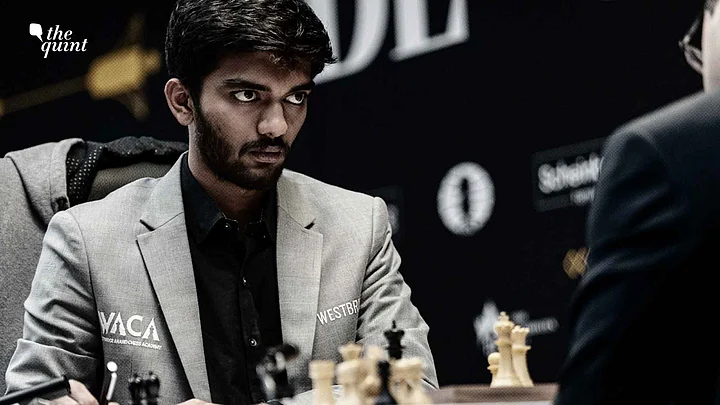heA picture from January 2018 shows Viswanathan Anand, the five-time World Chess Championship winner, handing a rather gigantic trophy for a U-13 competition, to an elated 11-year-old prodigy.
The potential of the kid – who had brushed aside any and every opponent with exceptional ease in the competition, but was now fighting with all his might to hold on to the trophy – was extensively documented in that tournament.
Yet, even the most accurate of prognosticators couldn’t have predicted that some six years down the line, the same kid who received the gigantic award, will equal the feat of the venerated presenter.
On 22 April, Dommaraju Gukesh became only the second Indian chess player to win the Candidates Tournament, after Anand. That was not all, however, as he also became the youngest-ever to win this competition, at only 17 years of age.
Should he win the World Chess Championship by beating defending champion Ding Liren from China, he will become the youngest-ever chess champion.
Here’s the story of how he went from being a talented youngster with the potential to be among India’s better chess players, to becoming the benchmark for others to follow:
Started at a Summer Camp
As is the case often with teenage prodigies, Gukesh started playing the game very early – when he was a little over six, albeit his journey is not exactly along the most trodden-on lines.
However, unlike Rameshbabu Praggnanandhaa, who was intrigued by his elder sister’s chess classes, or Vidit Gujrathi, who started off by playing against his father, Gukesh’s affection towards the sport was an acquired taste, as opposed to being an innate one.
In fact, it is only after seeing his son excel that his father Rajinikanth decided to offer the 64 squares some serious thought, but only to provide company to his son. Now, although nowhere near as high as Gukesh’s, Rajinikanth also has an ELO rating.
The journey started during a summer camp organised by Gukesh’s school, Velammal Vidyalaya, where his mother Padma – a microbiologist who works at a hospital – decided to get her ward enrolled in chess.
The first to spot Gukesh’s talent was MS Bhaskar, who knew well that the bond between the kid and the chess board will extend way beyond the realms of the summer camp.
Taking the Right Call
Soon, Rajinikanth and Padma would also know that their child is meant for the grandest of stages, and biggest of achievements, and eventually, the hour arrived to take a career-defining call. Fortunately, they took the right call.
Rajinikanth, who would initially do a half-and-half split of attention between his profession and Gukesh’s ambition, chose to completely eschew the ENT surgeon, in favour of the father. Soon, there were results.
Becoming an International Master at 11
The first major stride, on a list of numerous strides, saw him becoming a Candidate Master, which he achieved by winning the Under-9 division of the 2015 Asian School Chess Championships.
The plans of becoming the youngest GM ever were immediately formulated, but before that, he had to become an International Master (IM).
His career graph hadn’t seen anything else but an uphill curve since the 2015 triumph, and three years later, he occupied an audacious seventh position in France’s Cappelle-la-Grande Open, which made an IM at the age of 11.
Narrowly Missing Out on Making History
Following that outing, Gukesh went on to win five gold medals at the Asian Youth Chess Championships, and also won the U-12 World Youth Chess Championships – all in the same year.
The ultimate goal, albeit, was not realised.
By December 2018, Gukesh had earned two of the three GM norms necessary to become a Grandmaster. Then having an ELO rating of 2490, another flawless outing in Barcelona’s V Sunway Sitges International Chess Festival would have made him the official disruptor of history, beating Russia’s Sergey Karjakin to become the youngest GM.
An Unceasing Package of Surprises
While he needed 7 points and a live rating of 2600, he ended his campaign with 6.5 points, drawing his must-win last match.
The third GM norm eventually arrived at the Delhi International Chess Grandmaster Open a few weeks later, and while he could not beat Karjakin by merely 17 days, Gukesh became the then youngest Indian GM, at the age of 12 years, 7 months and 17 days.
The uphill climb, in synchronisation with wins that can be considered ‘upsets’, has been unceasing since then. In 2020, Gukesh defeated Chinese GM Chongsheng Zheng to win a competition in Denmark’s Hillerod Chess Club, whereas he also stood first at the Cannes Chess Festival just a few days later.
A couple of years later, he won an individual gold medal at the Chess Olympiad, whilst helping his team secure a bronze medal. The biggest ‘upset’, however, was yet to arrive.
On 16 October, then aged 16, Gukesh became the youngest player to beat the world number one, Magnus Carlsen. Incredibly enough, while he did say he was happy with the win after the match, he was quick to mention how he was not proud of his gameplay.
The spike has now taken him to a Candidates Tournament triumph. But, despite all he has achieved so far, it feels that Dommaraju Gukesh is only getting started.
(At The Quint, we question everything. Play an active role in shaping our journalism by becoming a member today.)
